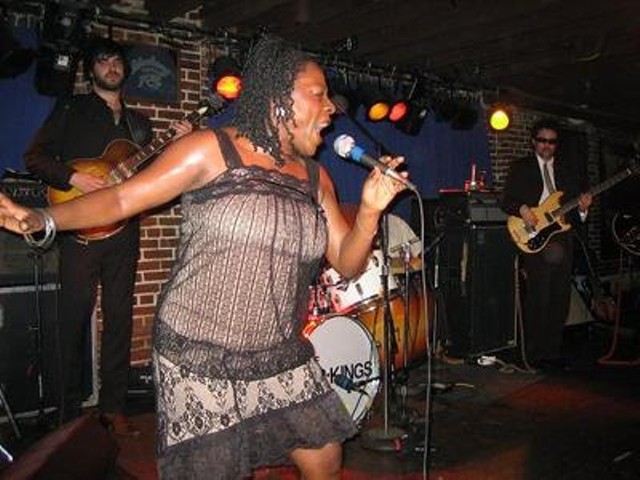If a generation of Pitchfork and Stereogum readers, who otherwise care squat about soul music, have been turned on to Sharon Jones and the Dap-Kings, you wouldn't really know it from the under-dressed crowd at the Duck Room on Wednesday night. Old heads from KDHX, the mature staff of Vintage Vinyl (who got the night off plus tix courtesy of their overlords) and other sundry silver foxes and foxettes (some of who briefly attempted to build a blockade of chairs at the front of the stage; yeah right) dominated the sold-out room. Good for us. And good for whoever persuaded Beatle Bob to do his thing far off in a dim corner of the room.
According to my poll, no one knew anything about designated opener The Ivan Milev Band. Milev, turns out, is the Jimi Hendixocov of the accordion, and his band was fiddler Entcho Todorov. And if you're thinking "WTF?" then you have the picture just about right. The two play Bulgarian dance tunes at Mach 7 speeds, with humor and dexterity, as if they relish the absurdity of making opaque, math-folk, freak-scale music before a crowd who came for funk. But the juxtaposition somehow worked. By the end, when Milev was biting, sucking or blowing into some part of his black Scandalli squeeze box, tossing in an "Oh Susannah" lick, and then mashing and needling his keys in full free-jazz showmanship, the audience pretty much got it -- whatever the hell it was.
How do you know when it's show time at a Sharon Jones concert? It's not when the horn section -- trumpet, tenor sax and baritone sax -- set up; nor when bassist, songwriter and band leader Gabriel Roth (aka Bosco Mann) adjusts the angle of his wrap-around shades; nor when emcee and rhythm guitarist Binky Griptite checks the crease in his slacks. No, it's when the reefer smoke from the green room engulfs the room like invisible fog-machine mist. How a band that high can play so tight is a mystery no critic is prepared to answer.
And what's tight, anyway? It's a responsiveness that could pass for martial training if the locked rhythm -- driven by young drummer Homer Steinweiss and conga player Bugaloo Velez -- didn't drip funk. It's a simple signal tap of Mann's polished shoe toe that sets the band to a collective forward and backward and side-to-side that could be a dance of pure cool if the results weren't pure heat. It's eight band members in-tune, on-time, of-nothing-but-the-groove, which only begs another question: What is groove?
Griptite's fast and finely rehearsed blipster intro and immediate merch plug is groove. The synchronized chonka chinka chinka chonk of two electric guitars is groove. It's the certain Clyde Stubblefield thwack-tone of a snare and congas together like a pop corn machine driven by an atomic clock. It's Dave Guy, Neal Sugarman and Ian Hendrickson-Smith knowing their horn lines as they know to breathe. It's eight parts and one sound, no matter that the band is just warming up.
It's also Augusta, Georgia native Sharon Jones, dressed tonight in a casual (for this band) black and grey sheer skirt and blouse, hair in tight pigtails, feet tight in tiny stiletto heels, and more tight sexuality in the mole above her left eye than all the runways in New York, the band's home. Jones used the Duck Room stage like a runway, stalking it end to end, checking the sound, the lights, the space, and with her first number, she proved her genius for rhythmic singing—she's not the most overpowering soul singer alive, but she may be the most tuned to time—and for finding the most irredeemably dorky white dudes to dance with, not that there were any shortage of those.
To call Jones a powerhouse or a force of nature doesn't quite get it. There's something about the space her band creates, the kind of soul-funk fusion, that makes the most of her gospel-trained gifts and her love of spectacle and dance. With the Dap-Kings behind her, she uses that sonic space for own agenda, her own story. On a tune like "Be Easy," one of the night's many selections from the gospelly 100 Days, 100 Nights, she can invoke Carla Thomas and Bettye Swann at the same time, and still retain her own relation to the blues both unholy and holy (Jones has plans for a full on gospel album). When she asks for a towel (she's drenched in sweat by the third number), Binky brings her a dozen.
While the devastating finale of "It's a Man's, Man's, Man's World" (not to mention the best band introductions ever) drew a straight line to the James Brown source, the rap-dance-preaching she merged with "100 Days, 100 Nights" found and freed the source of the source: African and Native American culture and history. With her body and voice, she recounted the middle passage, the struggle, the blood, the betrayal, the endurance and the moves that run through all of American soul music regardless of (but not without) race. This night was an "old school" spectacle, in the best sense of that word, but obviously not a seminar. All the same, Jones schooled every last soul in the room.
-- Roy Kasten





